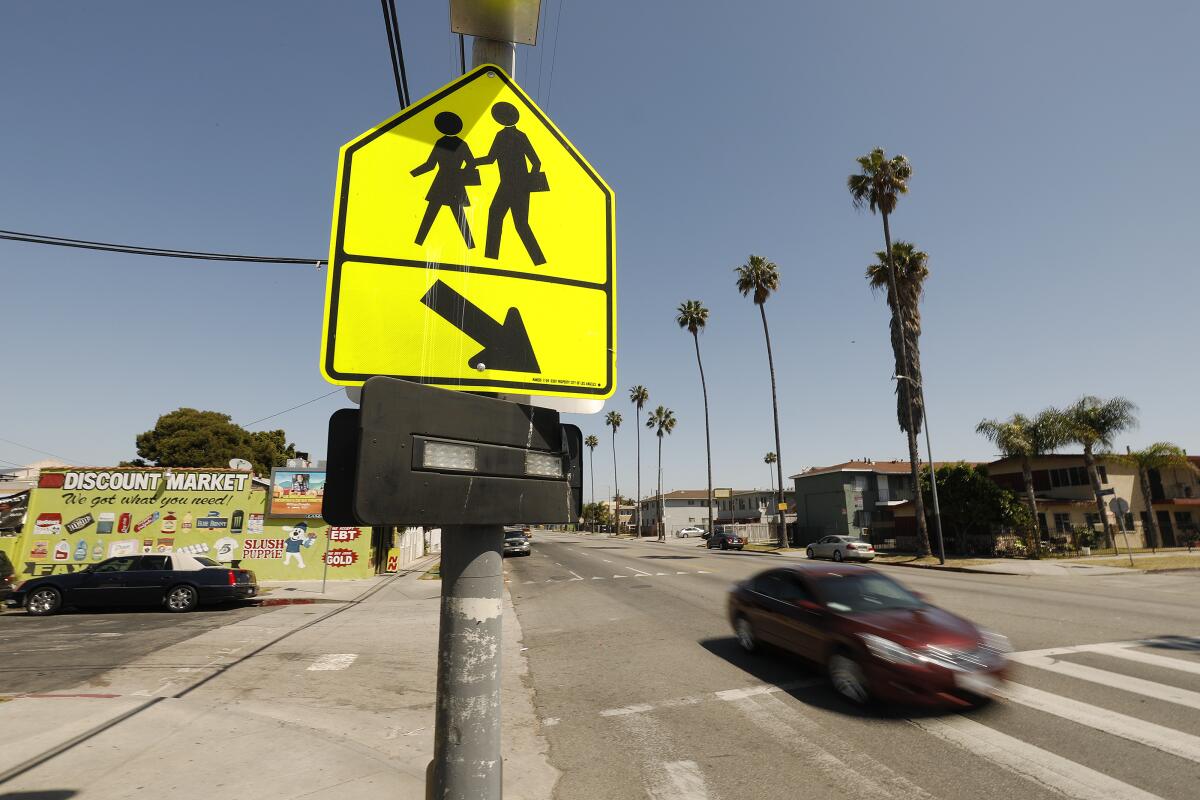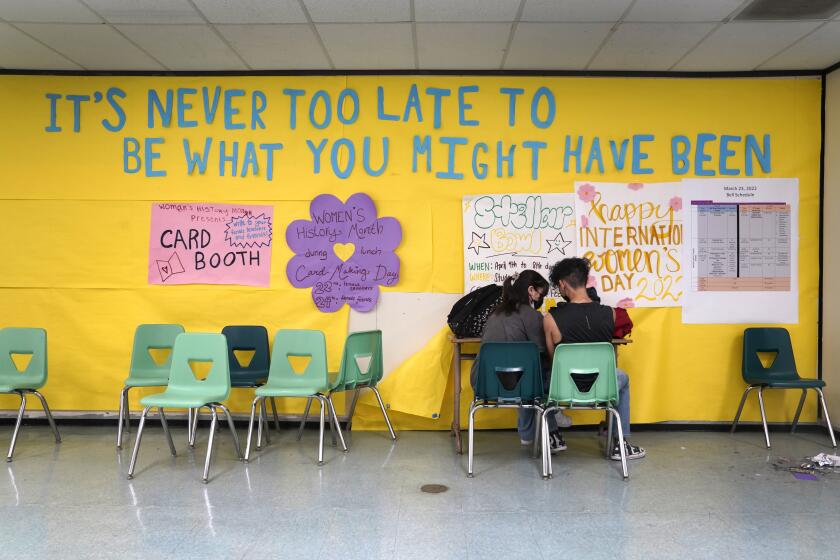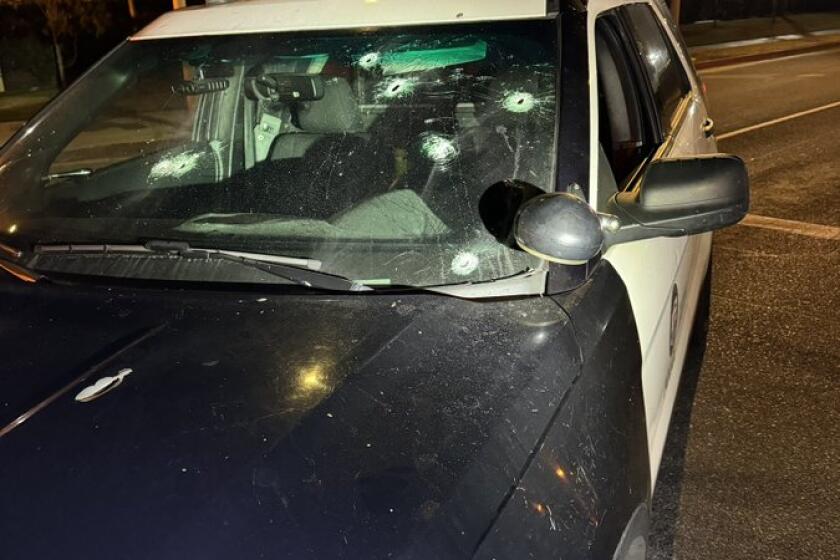L.A. County wants zero traffic deaths — but won’t fund safe streets, advocates say

Good morning, and welcome to L.A. on the Record. It’s Rebecca Ellis, bringing you the latest in the county’s budget discussions with help from my colleagues David Zahniser, Dakota Smith and Rachel Uranga.
Get the lowdown on L.A. politics
Sign up for our L.A. City Hall newsletter to get weekly insights, scoops and analysis.
You may occasionally receive promotional content from the Los Angeles Times.
It’s time for belt-tightening in Los Angeles County.
Blame it on the state — and the bleak, and then bleaker, projections for this year’s budget deficit.
With an estimated shortfall of nearly $45 billion, the state government is going to shrink. And that means L.A. County, which relies on hundreds of millions of dollars in state funding, may have to contract right alongside it.
“We’re all feeling the pain,” said L.A. County Supervisor Janice Hahn at a budget hearing last week, the morning after Gov. Gavin Newsom released the latest details on the shortfall.
County officials warn that this could mean a shrinking of the region’s social safety net, forcing them to claw back support for indigent defendants, low-income families and teenagers aging out of foster care.
And there’s one pot of money that some budget scrutinizers say was far too small in the first place.
“The funding for L.A. County’s Vision Zero Program as it currently stands is almost, to me, at an irreducible minimum,” said Damian Kevitt, executive director of Streets Are For Everyone, which works to bring traffic fatalities across the car-centric region to zero. “It is just nuts.”
This month, some of the loudest outcry over the county’s budget proposal has come from pedestrian-minded Angelenos like Kevitt. In email blasts and at a recent board meeting, they have decried the funding for safe streets as peanuts at a time when fatalities keep mounting.
This year’s recommended budget allocates $20 million to Vision Zero improvements aimed at ending traffic deaths in unincorporated L.A. County, according to the county’s Department of Public Works, which initially asked for an additional $7.5 million but didn’t get it.
The department is responsible for the 3,300 miles of roads in unincorporated communities across the county — places like Marina del Rey, Hacienda Heights, East Los Angeles and Altadena.
“Deaths have climbed instead of gone down,” said Michael Schneider, founder of Streets for All, a group pushing to make L.A. more navigable for pedestrians. “And the reason for that is we have lacked resources.”
At the end of 2019, a year in which 79 people lost their lives in crashes on county-maintained roadways, the county released its Vision Zero plan, which set an ambitious goal of zero traffic deaths by 2035. A few years earlier, then-Mayor Eric Garcetti had pledged to get to zero across the city of Los Angeles by 2025.
Advocates say neither the county nor the city is close.
In 2022, 125 people died due to traffic collisions on county-operated roads. Last year, 92 people died. As of early March, 13 people had died, according to county records.
The city, meanwhile, saw 336 people die last year in crashes — more than were killed by homicide.
“They’re both failing,” said Schneider.
The Department of Public Works said in a statement that the agency has, since 2020, spent over $50 million to enhance street safety, putting in curb extensions at intersections and making crosswalks more visible, among other improvements. The agency said it “aggressively pursues grant funding” from state and federal agencies as well.
Still, the deaths keep coming. Last February, the county was awarded a $21-million grant to address a particularly grim 3.5 square miles in the Florence-Firestone neighborhood of South Los Angeles, where, according to county records, nearly 70 people have died in the last decade.
In the year since the county got the money, at least four more people have died in crashes in Florence-Firestone, according to data from UC Berkeley. Supervisor Holly Mitchell, who represents the area, recently put forward a motion to try to get the street improvements fast-tracked, saying the area was in the midst of a “traffic safety crisis.”
Mitchell’s district encompasses many of the county’s so-called “collision concentration corridors” — considered some of the most dangerous streets for both pedestrians and drivers.
That includes a perilous stretch of Avalon Boulevard where Raymond Olivares, a civil engineer with the city of Los Angeles, was fatally struck last February by a speeding driver as he was crossing with his fiancée.
Eight months after Olivares’ death, a 41-year-old man was killed about half a mile away while crossing the same street.
“There’s no sense of urgency,” said Cindi Enamorado, Olivares’ sister, who said her brother would have turned 28 this week. “It’s just an accident waiting to happen.”
State of play
— THE PUSH FOR PREZ: We told you last week about Councilmember Marqueece Harris-Dawson’s push to become the City Council’s next president. The other shoe dropped on Friday, with seven council members introducing a motion to install him in the post, effective Sept. 20. Until recent weeks, Harris-Dawson’s primary rival appeared to be Councilmember Bob Blumenfield, who had expressed interest in the position.
— SETTING A DATE: The motion supporting Harris-Dawson showed up three days after Council President Paul Krekorian disclosed his own plan for relinquishing his post on Sept. 20. In a letter to his colleagues, Krekorian said that timeline would allow for a smooth transition to a new president. Krekorian leaves office in December, due to term limits.
— SELF-INFLICTED WOUND: The City Council approved its bummer budget for 2024-25, eliminating about 1,700 vacant positions at various city agencies. Eunisses Hernandez was one of three council members to vote no, blaming the cuts in large part on police raises approved by the council and mayor. Blumenfield pointed out that multi-year pay increases were awarded not just at the LAPD but an array of other city departments, with council members fully aware they would be financially painful. “We made that choice,” he said.
— HOSTEL ENVIRONMENT: Illegal hostels that serve tourists and other short-term visitors have been opening up in residential parts of L.A. where they’re not allowed, The Times reported this week. The situation has upset some Angelenos, who say the unpermitted businesses have attracted crime and other disruptions.
— MESSINESS AT METRO: The former security chief for the Metropolitan Transportation Authority gave a bruising assessment of Los Angeles and Long Beach police officers and sheriff’s deputies assigned to patrol the region’s buses and trains, arguing that they are not proactive about passenger safety. Gina Osborn, a former FBI agent, was fired by Metro last year. Her attorney said she is a whistleblower who was improperly pushed out.
— ELEPHANT OUTCRY: The City Council has asked for a study looking into the recent deaths of two L.A. Zoo elephants after both were euthanized in the span of a year. Animal advocates have claimed the declining health of the two elephants is directly related to their captivity.
— PUSHED ASIDE: UCLA’s police chief has been removed from his post and reassigned, weeks after he came under sharp criticism over his agency’s response to violence that broke out at a pro-Palestinian encampment on campus. Several City Council members are seeking an after-action report on the LAPD’s response to the demonstrations at UCLA.
— GETTING THE GREEN LIGHT: An appellate court ruled this week against several Studio City neighborhood groups that were seeking to halt construction of Harvard-Westlake’s new athletic campus. The groups are also suing over the city’s approval of the project.
Enjoying this newsletter? Consider subscribing to the Los Angeles Times
Your support helps us deliver the news that matters most. Become a subscriber.
Quick hits
- Where is Inside Safe? The mayor’s signature initiative to address homelessness did not launch any new operations this week. On Thursday, the council passed a budget that allocates $185 million for the program in the next fiscal year.
- On the docket for next week: The City Council is set to vote Tuesday on the motion to make Harris-Dawson the next council president, replacing Krekorian.
Stay in touch
That’s it for this week! Send your questions, comments and gossip to LAontheRecord@latimes.com. Did a friend forward you this email? Sign up here to get it in your inbox every Saturday morning.
Start your day right
Sign up for Essential California for news, features and recommendations from the L.A. Times and beyond in your inbox six days a week.
You may occasionally receive promotional content from the Los Angeles Times.




